SOPP631: What is a minimum of major/minor scales, vs Hanon finger exercises, vs practicing a piece?12/4/2020
Vidas: Hello and welcome to Secrets of Organ Playing Podcast!
Ausra: This is a show dedicated to helping you become a better organist. V: We’re your hosts Vidas Pinkevicius... A: ...and Ausra Motuzaite-Pinkeviciene. V: We have over 25 years of experience of playing the organ A: ...and we’ve been teaching thousands of organists online from 89 countries since 2011. V: So now let’s jump in and get started with the podcast for today. A: We hope you’ll enjoy it! V: Hi guys! This is Vidas. A: And Ausra. V: Let’s start episode 631 of Secrets of Organ Playing Podcast. This question was sent by Keith, and he writes in response to my letter asking what are his goals and challenges in organ playing. He writes, Vidas, Thank you for sharing your knowledge and love of organ playing. My dream for organ playing is to facilitate the expression of worship in music, with the language of harmony. What things are holding me back from my dream? 1. My ignorance/lack of skill. - In February I dusted off my marginal four years of grade school piano lessons, after 34 years. 2. Realizing what good technique is - what such technique should feel like when I practice and play. 3. Practice method/discipline - What is a minimum of major/minor scales, vs Hanon finger exercises, vs practicing a piece. - I practice about an hour a day, some days twice that. Wish I could practice more. The mini-course emails have been very helpful to me. I let them queue up behind each other, until I have a chance to fully consider each one. Regards, Keith V: So Keith has been a recent subscriber to our newsletter, and his question is kind of very interesting, right? Where do we start, Ausra? A: Well I wish to congratulate him first, that after not playing for so many years, he realized that he needs to do it. I think that’s a wonderful way to get back to music. V: Yeah. We’re recording this in the month of November, so he writes that in February he started playing again the instrument, right? Which is half a year or so, more a little bit, almost a year, I would say closing to one year. So his dream of facilitate the expression of worship with the language of harmony, how do you understand it, Ausra? A: Well that’s a very poetic way of expressing himself. V: Language of harmony. Harmony means connection and science about the chords, right? So does it mean that the harmony needs to be taken into consideration when Keith plays in a worship, or what.... A: Well I think in this context I would say that harmony doesn’t mean that what I teach my school kids about connection of chords. It’s more probably about harmony in general, as overall understanding of music for worship. V: Uh huh. How music harmonizes our souls, right? A: Yes, I think this is more what he meant, if I’m correct. V: Okay. So the things that are holding him back - the first is lack of skill and his ignorance. Obviously after not playing for 34 years, you have to start someplace, somewhere, right? Doesn’t always mean that you start in an advanced stage. Most likely you start at the basics. A: Sure. But you know, it’s good that you don’t start from scratch, because I understand from the letter Keith had a few years of school piano lessons, which is good. Because then it’s easier to remember what he has done, and for his muscles, it’s easier to remember what he has done and to practice and to improve in an organ. V: So to answer the first part of the question, it’s like the skill will increase along with his experience. The more he practices, the more it will increase. A: Yes, it’s very simple. The more you will put in, the more you will get back. V: Mm hm. The second question is about the technique. What good technique feels like when people play. I would say, before you answer, Ausra, I would say that it’s very obvious. It’s effortless. A: Yes. That’s what I wanted to say. If you sit down on the organ bench and you can play a chosen piece without any hesitation and without too much of an effort, and obviously fluently without mistakes, then I think you will know that your skills are good enough, and that you are using good techniques and right fingering. V: So correct. I think the technique will come also from practice. And I think he doesn’t have to worry about the end result right now, it’s just he has to do the steps, do the process right now. A: Yes, it’s like right now I am working on the Bach’s Prelude and Fugue in G Major, BWV 541, and it has that nice opening in the pedal section where it’s only one single line. But then later, after two lines, the whole texture appears, and pedals come up and it’s quite a thick texture. And I usually play that introduction at the right tempo, at the concert tempo, and then I have to slow down when other voices come. But I dreamt that someday I can play everything in the same tempo and I won’t have to slow down when the hard spot begins. And I’m getting close to it, and it’s, actually it’s coming very gradually. But it’s sort of like a miracle, all this learning process. V: To me, I just played my recital last weekend, so I’m also starting to pick up new repertoire for my next recital by recording 10 step videos for people to practice alongside with me. And I also notice that when I sit down on the bench, I know that I can practice the first step, but not the tenth step. Tenth step is way out of reach today. But in a longer piece, like today I played the five pages long Allegretto by Vierne, it is an intermediate level piece, very nice harmony, Vierne’s chromatic harmony, and I thought that I would need a couple of more days to master this. So today, it felt rather good, but tomorrow when I will come back, I know that what I worked on today will be much less secure. And that’s okay, you need a few extra days and don’t rush things. A: Well, and about the last part of the question, how about… V: Scales, Hanon exercises, and the repertoire practice. A: Yes. About proportional, how all this should be done. I guess half and half would probably wouldn’t be the right way. I would do much less. Just simple exercises and more work on the repertoire. Because while working on the repertoire, you can solve also some of your technical issues, technical problems, and just playing scales and arpeggios and chords might be too boring, and you might give up after awhile. So I would say if you are practicing for an hour every day, do 10 minutes of practicing scales and arpeggios, and spend 50 minutes for working on the repertoire. V: You, so you mean like ⅙ of the time should be spent on the technique, right? If you have only one hour. A: Yes, that’s what I said. V: If you have three hours, then you can spend more. A: Yeah. V: But in one hour, it’s not enough to play the repertoire for 20 minutes or 30 minutes. You have to do more at the expense of the technical exercises, obviously. Hopefully, Keith can practice more than one hour per day if he wants to achieve better results from time to time. A: Yes, because this art of playing organ, of playing any kind of musical instrument is time consuming thing. V: Yes. Today I practiced, I think for two hours almost. One hour and 15 minutes I spent on that piece, Allegretto by Vierne, and 30 minutes, I spent 35 minutes maybe, on improvising a fugue. And that’s not enough. Obviously I will practice at the end of the day the rest of my concert repertoire. A: Yes, and people who are not related to music, non-musicians, they don’t understand the time we spend actually working on our repertoire to get ready for our recitals. Like my cousin just asked me recently, “Why do you still need to practice? You are a professional.” And I told her that if I would play the same repertoire over and over again, let’s say I would have like 10 or 20 pieces that I would play my entire life and would repeat them over and over again, then yes, of course I wouldn’t have to practice. We would be alive all the time. But because I’m playing a different repertoire and still learning new pieces, so I still need to practice. V: Yes, and I mean that you need to repeat each step that you're learning at least three times in a row without mistakes. Well at least three times in general, not counting the mistakes. But imagine if you just sit down and play one step, whatever that step may be at the current stage, either in quarter notes or in half notes, or one line at a time, or maybe one hand at a time, or just the pedals - whatever is your current goal with that segment or that piece. So, if you just play through, what you're doing is you’re basically just repeating previously mastered material. Yesterday - you learned something yesterday, you repeat it today. And that’s it. You don’t progress. But if you play it one more time, the second time you start to feelsome, a little bit of progress. Obviously not enough to advance faster, but the second time is already I think noticeable. So I suggest you do it at least three times. Do you feel that way, Ausra? A: Yes, I feel that way too. V: Each step, I mean. A: Yes. V: Mm hm. So when you practice G Major Prelude and Fugue 541, you practice it three times as a rule, right? A: Yes, that’s what I usually do. And the first time is always the worst. And the last one is the best. And if I would, let’s say I would come up the next day and I would be able to play right away as my third time of previous day, I would feel very happy. V: But that only will happen when you are ready, right? When you have repeated, I don’t know how many times, 100 times entire piece? Played all those steps totalling 100 repetitions. A: Well, I haven’t counted them, but yes, I guess you need to do that. Because it’s sort of, it’s a not very hard piece, but it takes some time to learn it. V: Yeah, it’s not very hard when you’re playing in the comfort of your home. But if you’re pretending to play in public, like at home but recital, like we do on Hauptwerk, or in a church, different acoustics, also in public, then entirely different situation. So yeah, spend at least three repetitions with each step. That’s the minimum to progress. And only 10 minutes a day for technical issues. A: If you’re practicing only for one hour. V: Yeah. All right, guys. This was Vidas. A: And Ausra. V: Please send us more of your questions. We love helping you grow. And remember, when you practice, A: Miracles happen. V: This podcast is supported by Total Organist - the most comprehensive organ training program online. A: It has hundreds of courses, coaching and practice materials for every area of organ playing, thousands of instructional videos and PDF's. You will NOT find more value anywhere else online... V: Total Organist helps you to master any piece, perfect your technique, develop your sight-reading skills, and improvise or compose your own music and much much more… A: Sign up and begin your training today at organduo.lt and click on Total Organist. And of course, you will get the 1st month free too. You can cancel anytime. V: If you like our organ music, you can also support us on Patreon and get free CD’s. A: Find out more at patreon.com/secretsoforganplaying
Comments
Vidas: Hello and welcome to Secrets of Organ Playing Podcast!
Ausra: This is a show dedicated to helping you become a better organist. V: We’re your hosts Vidas Pinkevicius... A: ...and Ausra Motuzaite-Pinkeviciene. V: We have over 25 years of experience of playing the organ A: ...and we’ve been teaching thousands of organists online from 89 countries since 2011. V: So now let’s jump in and get started with the podcast for today. A: We hope you’ll enjoy it! V: Hi guys! This is Vidas. A: And Ausra. V: Let’s start episode 592 of Secrets of Organ Playing Podcast. This question was sent by Amir, and he writes: “Hi Vidas Thanks for your email! What I have now in my schedule is a daily time to practice sight reading. It does not take more than 15 minutes daily. At the same time I am redoing the exercises I have done 10 weeks ago. I find that looking at the same things again after 10 weeks of doing them, gives me more confidence that things are getting better. Most important benefit is for me to be regular in the sense of the beat pulse, and I think this is not beneficial for sight reading only but for music interpretation in general. It is better to do an intended "rallentando" than to slow down because the passage is just difficult. In addition these exercises are allowing me to predict to a certain extent my capabilities to keep a steady tempo in a piece of music. Looking at difficult passages and to have a certain estimation about how things can go, can help me to be steady. Changing to unexpected notes and rhythms is always tricky. Hoping that I am getting better. Amir” V: So, Amir is in our Organ Sight-Reading Master Course, Ausra. A: Excellent! V: And it seems that he’s spending 15 minutes a day, every day, and seeing regular practice, and seeing also regular progress, and he is actually checking the progress by playing exercises from 10 weeks ago. A: I think that he touched some very important points that I think could be beneficial to many of us. V: Such as? A: Such as that spending 15 minutes every day on something is very important. It’s more important to spend 15 minutes a day on a regular basis than to spend let’s say 3 hours once a week. I think such a case, if you spend some time every day regularly, you’ll see progress much faster. V: I have another point to make about his rallentando, conscious rallentando and conscious change of tempo. If you have to slow down, you have to know that you are slowing down, and if that piece of music changes, direction changes rhythms and pulse, you have to be quite conscious about it. Right? A: Yes, definitely! Your technical difficulties cannot dictate the tempo of the piece. If you can play it fast but some difficult passages you have to slow down, it means this tempo is too fast for you, and you need to play the entire piece in a slower tempo. V: To me, when I’m playing a rhythmically difficult piece, it helps me to play really really slowly at first. Do not speed up the passage before I can play it comfortably. Do you find it useful, too, Ausra? A: Yes, although sometimes I lack either the time or the patience to do that, but I see what you are doing, and I think it’s very beneficial. V: It takes time and patience, as you say, but you reap rewards! You see how the piece of music is getting better and better, maybe not daily, but probably weekly progress can be noticeable. Right? A: True. V: A lot of people don’t have the patience to do this, but one week is not that long, right? You can come back to a difficult passage after one week and play it through, and see that it’s not that difficult anymore. A: That’s right. I think it’s always good to go back and to play, let’s say, the same thing that you played a week ago or two weeks ago, and you will see how much better you are. V: And for your repertoire in general, I think it’s better to refresh it once in a while regularly. Keep it under your fingers and under your toes, because then you expand your repertoire, not just discarding it by learning new pieces every time, but you’re expanding your baggage of tricks. A: Yes, as you said, to keep it under your toes, I didn’t know that you play with your toes! I thought that you played with your feet! V: Oh, I have excellent toe technique! Five toe technique! A: Could you play a trill with your one foot using different toes? V: I can play two trills! Double trills! A: That’s funny. V: You know, I sometimes marvel at organists who play, or can play long recitals very frequently like maybe once a week or twice a week of difficult and different organ music every time, and I wonder what’s their secret. And the secret probably is refreshing their old material once in a while, frequently, while also learning something new! A: Well, he keeps asking me, “How can we do this? How can we do this? Tell me how can we do this?” And I’m just saying that they are more talented and more hard working than you are, so that’s the secret. V: Yeah, there is one Dutch organist whom I admire. Minne Veldman… I had to think about spelling of that name… but ok, Minne Veldman. And he plays like twice a week on YouTube, one hour long recitals, sometimes from his living room with Hauptwerk, sometimes from different churches. It's just superhuman to me. Don’t you think? And I asked him in a comment, “What is your secret? How are you able to play like three recitals per week?” because recently he posted three recitals. He actually answered, although he’s very well known and very popular, probably gets a lot of comments like this. But he answered, “Just keep playing and studying large repertoire.” This is true, right? A: Yes, this is true! V: Simple, yet effective. A: You cannot expand your repertoire if you will sit on the couch all day long watching TV. V: And talking about expanding repertoire. A: And talking about playing. V: Yeah. We all suffer from this, right? We see big names and try to emulate them and imitate them, but when it comes down to doing the work, there is no substitute. A: True. V: Thank you guys, this was Vidas, A: And Ausra! V: Please send us more of your questions; we love helping you grow. And remember, when you practice, A: Miracles happen. V: This podcast is supported by Total Organist - the most comprehensive organ training program online. A: It has hundreds of courses, coaching and practice materials for every area of organ playing, thousands of instructional videos and PDF's. You will NOT find more value anywhere else online... V: Total Organist helps you to master any piece, perfect your technique, develop your sight-reading skills, and improvise or compose your own music and much much more… A: Sign up and begin your training today at organduo.lt and click on Total Organist. And of course, you will get the 1st month free too. You can cancel anytime. V: If you like our organ music, you can also support us on Patreon and get free CD’s. A: Find out more at patreon.com/secretsoforganplaying Today I have prepared a special exercise for you - a 3 part setting of the hymn tune "O Lord, how shall I meet you" in Bb major. In this exercise, the choral tune is presented in the soprano played by the right hand part. The left hand and pedals move in eighth-note rhythms with imitations. Practice this exercise in a slow tempo repeatedly until you can do it 3 times in a row fluently. You may have to play separate parts and combinations of two parts before putting everything together. Intermediate level organists: transpose this exercise a whole step higher to C major. Advanced level organists: transpose this exercise a whole step lower to Ab major. Here is the PDF file for printing and a MIDI file for listening. When you are done practicing, post your time to comments. All People That on Earth Do Dwell (Hymn Tune in the Lower Part)
2-part setting You can watch the video of creating this exercise and listen to the audio file. Exercise 1. Right hand and left hand together Exercise 2. Right hand and pedals together Exercise 3. Left hand and pedals together For beginner organists: Play 3 correct and fluent repetitions of separate parts in these exercises. For basic level organists: Play 3 correct and fluent repetitions of these exercises. For intermediate level organists: Transpose these exercises to A major. Play 3 correct and fluent repetitions of them. For advanced level organists: Transpose these exercises to B major. Play 3 correct and fluent repetitions of them. A PDF file for printing is here. Post your time to comments. All People That on Earth Do Dwell (Hymn Tune in the Upper Part)
2-part setting You can watch the video of creating this exercise and listen to the audio file. Exercise 1. Right hand and left hand together Exercise 2. Right hand and pedals together Exercise 3. Left hand and pedals together For beginner organists: Play 3 correct and fluent repetitions of separate parts in these exercises. For basic level organists: Play 3 correct and fluent repetitions of these exercises. For intermediate level organists: Transpose these exercises to A major. Play 3 correct and fluent repetitions of them. For advanced level organists: Transpose these exercises to B major. Play 3 correct and fluent repetitions of them. A PDF file for printing is here. Post your time to comments. Before Jehova's Awe-full Throne (Hymn Tune in the Lower Part)
2-part setting You can watch the video of creating this exercise and listen to the audio file. Also because this exercise is in 6/8 meter, watch the video about it. Exercise 1. Right hand and left hand together Exercise 2. Right hand and pedals together Exercise 3. Left hand and pedals together For beginner organists: Play 3 correct and fluent repetitions of separate parts in these exercises. For basic level organists: Play 3 correct and fluent repetitions of these exercises. For intermediate level organists: Transpose these exercises to A major. Play 3 correct and fluent repetitions of them. For advanced level organists: Transpose these exercises to B major. Play 3 correct and fluent repetitions of them. A PDF file for printing is here. Post your time to comments. Before Jehova's Awe-full Throne (Hymn Tune in the Upper Voice)
2-part setting Watch the video of me creating this exercise live and listen to the audio of this exercise. Exercise 1. Right hand and left hand together Exercise 2. Right hand and pedals together Exercise 3. Left hand and pedals together For beginner organists: Play 3 correct and fluent repetitions of separate parts in these exercises. For basic level organists: Play 3 correct and fluent repetitions of these exercises. For intermediate level organists: Transpose these exercises to A major. Play 3 correct and fluent repetitions of them. For advanced level organists: Transpose these exercises to B major. Play 3 correct and fluent repetitions of them. A PDF file for printing is here. Post your time to comments. Watch the video how I created this exercise (with my explanations): This Day at Thy Creating Word (Hymn Tune in the Lower Voice)
2-part setting Exercise 1. Right hand and left hand together Exercise 2. Right hand and pedals together Exercise 3. Left hand and pedals together For beginner organists: Play 3 correct and fluent repetitions of separate parts in these exercises. For basic level organists: Play 3 correct and fluent repetitions of these exercises. For intermediate level organists: Transpose these exercises to D major. Play 3 correct and fluent repetitions of them. For advanced level organists: Transpose these exercises to E major. Play 3 correct and fluent repetitions of them. A PDF file for printing is here. Post your time to comments. P.S. It seems that corrected PDF for Saturday didn't work either, so here it is again. Enjoy! UPDATE: It seems that PDF file didn't work in the original exercise for today. I corrected it and everything should work fine now. My appologies for any inconvenience. Scroll down to the bottom of this post to print the PDF of this exercise. Listen to the MP3 file of this exercise. This Day at Thy Creating Word (Hymn Tune in the Upper Voice)
2-part setting Exercise 1. Right hand and left hand together Exercise 2. Right hand and pedals together Exercise 3. Left hand and pedals together For beginner organists: Play 3 correct and fluent repetitions of separate parts in these exercises. For basic level organists: Play 3 correct and fluent repetitions of these exercises. For intermediate level organists: Transpose these exercises to D major. Play 3 correct and fluent repetitions of them. For advanced level organists: Transpose these exercises to E major. Play 3 correct and fluent repetitions of them. A PDF file for printing is here. Post your time to comments. Safely Through Another Day (Hymn Tune in the Lower Voice)
2-part setting Exercise 1. Right hand and left hand together Exercise 2. Right hand and pedals together Exercise 3. Left hand and pedals together For beginner organists: Play 3 correct and fluent repetitions of separate parts in these exercises. For basic level organists: Play 3 correct and fluent repetitions of these exercises. For intermediate level organists: Transpose these exercises to C major. Play 3 correct and fluent repetitions of them. For advanced level organists: Transpose these exercises to Db major. Play 3 correct and fluent repetitions of them. A PDF file for printing is here. Post your time to comments. |
DON'T MISS A THING! FREE UPDATES BY EMAIL.Thank you!You have successfully joined our subscriber list.  Photo by Edgaras Kurauskas Photo by Edgaras Kurauskas
Authors
Drs. Vidas Pinkevicius and Ausra Motuzaite-Pinkeviciene Organists of Vilnius University , creators of Secrets of Organ Playing. Our Hauptwerk Setup:
Categories
All
Archives
July 2024
|
This site participates in the Amazon, Thomann and other affiliate programs, the proceeds of which keep it free for anyone to read.
Copyright © 2011-2024 by Vidas Pinkevicius and Ausra Motuzaite-Pinkeviciene.
Terms of Service and Privacy Policy
Copyright © 2011-2024 by Vidas Pinkevicius and Ausra Motuzaite-Pinkeviciene.
Terms of Service and Privacy Policy



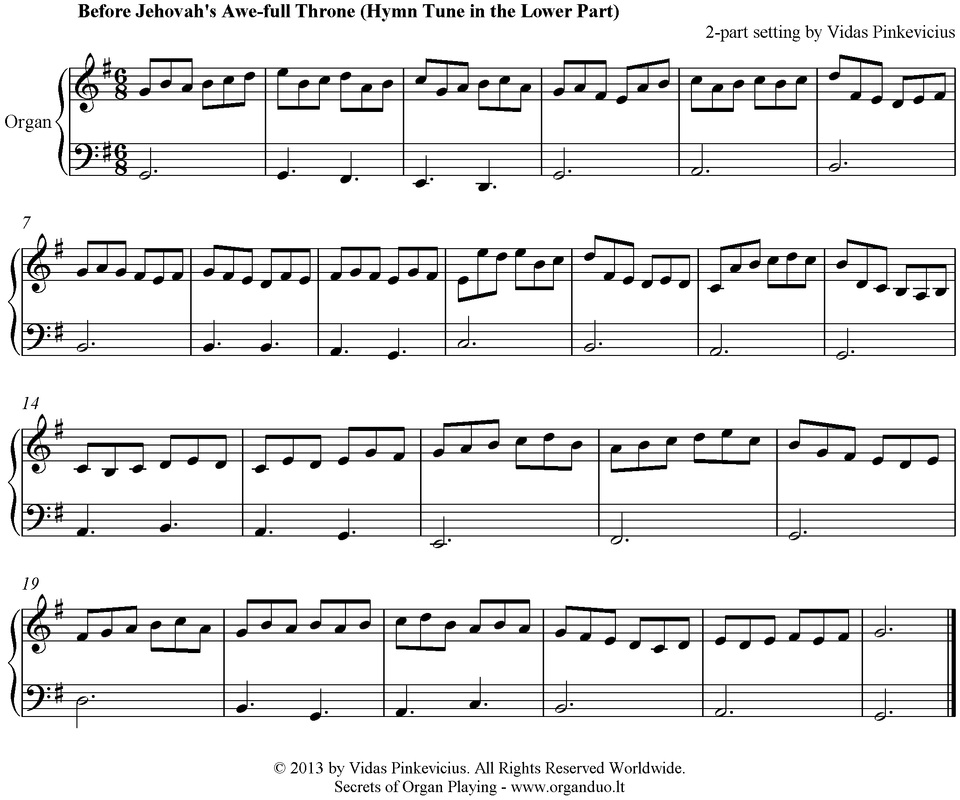
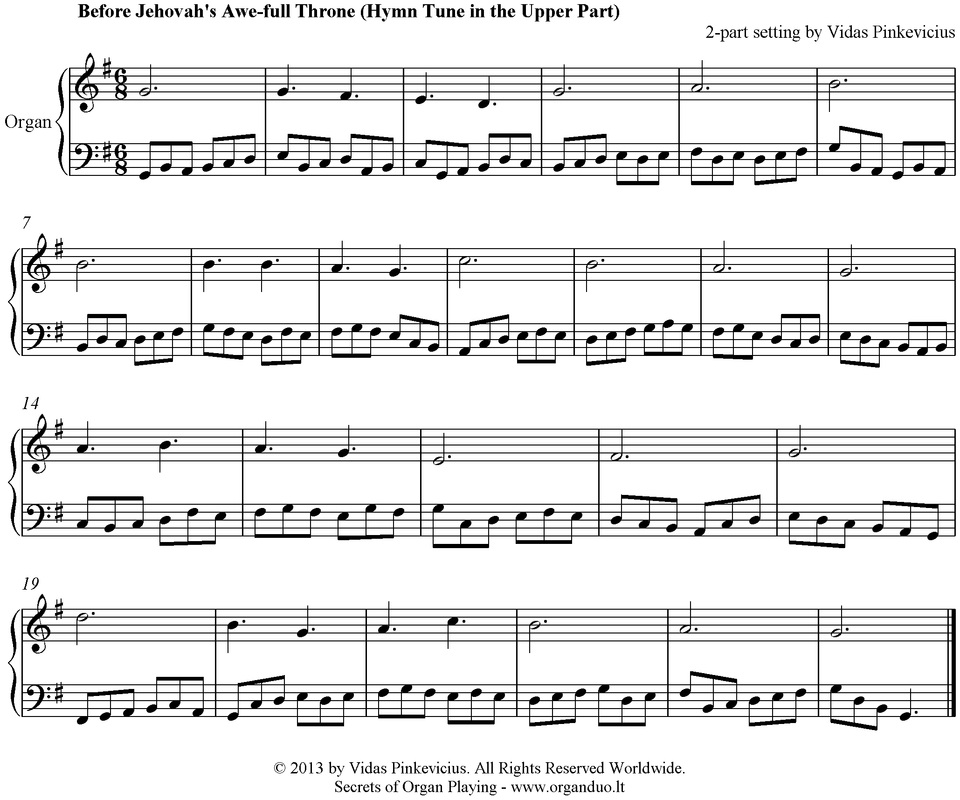
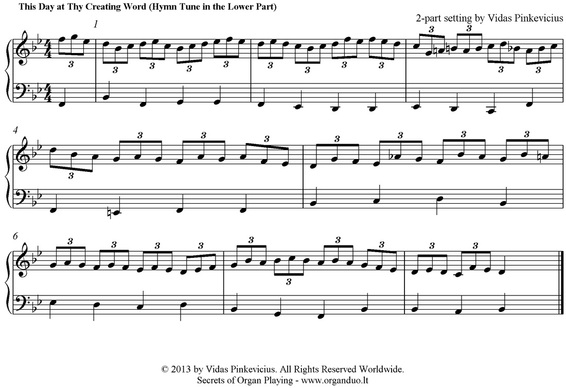
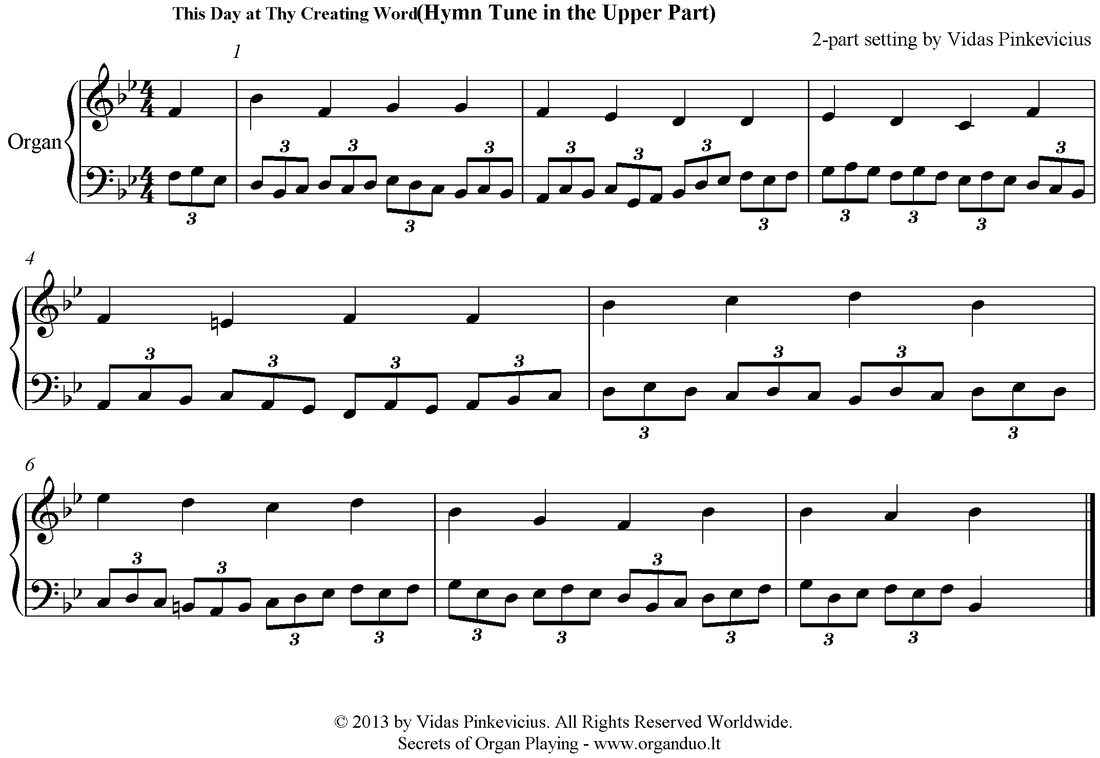
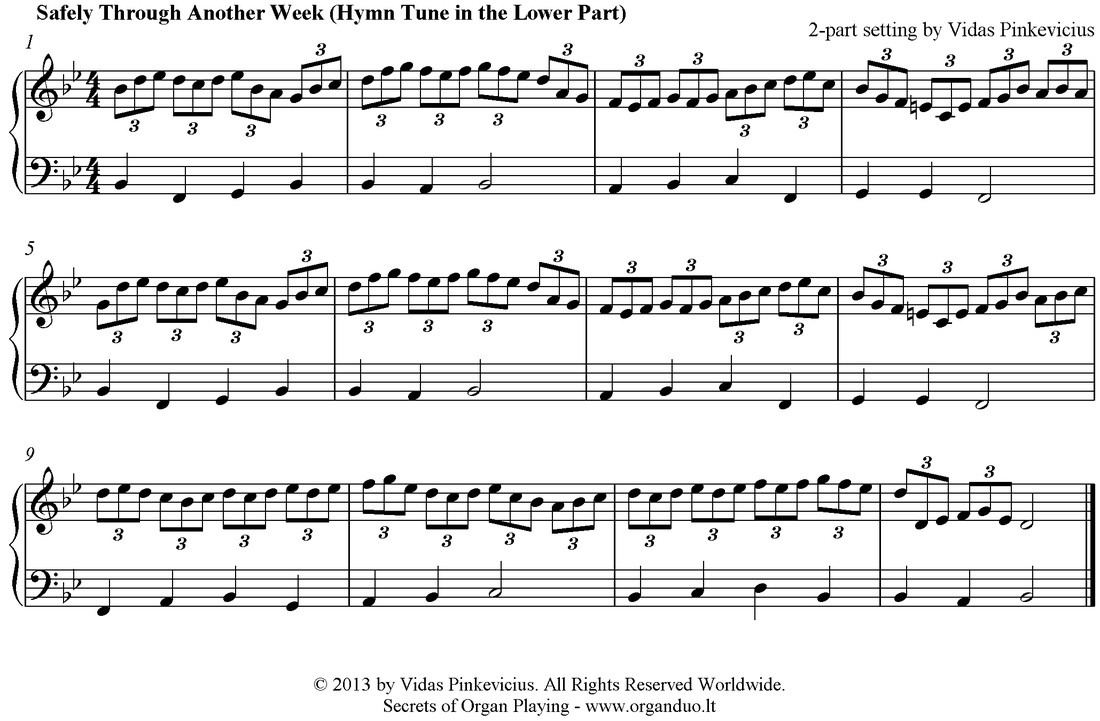



 RSS Feed
RSS Feed